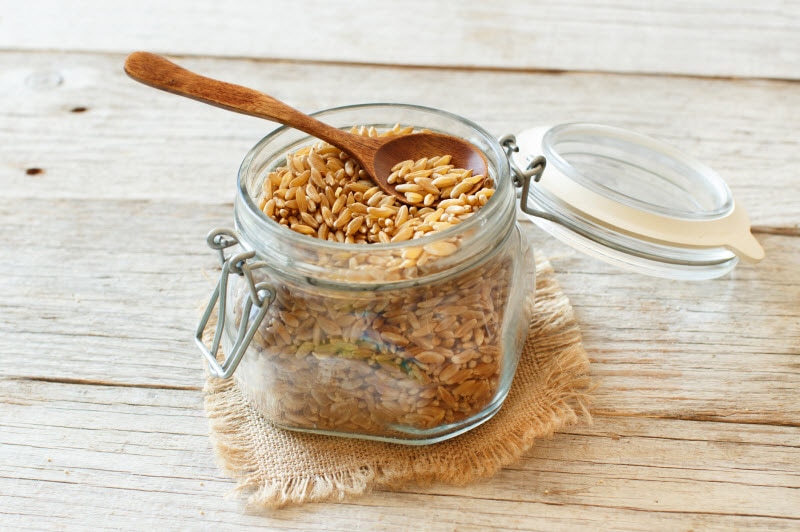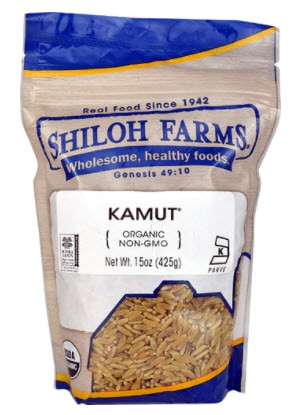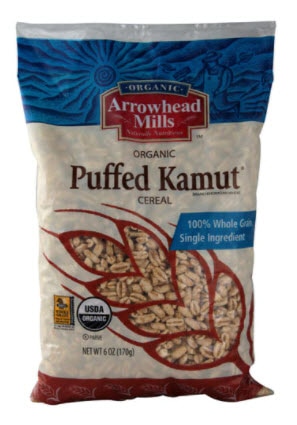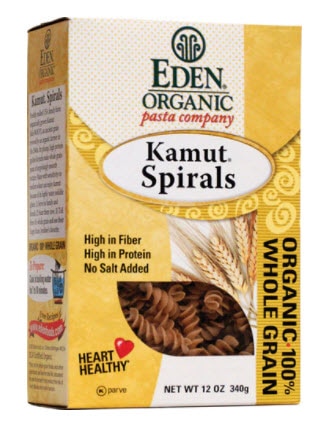“Ancient grains” seem to be sprouting up everywhere as a new food trend, and
Kamut® is on the list! While this grain is certainly trendy, it’s definitely not new. In fact, it’s about as ancient as you can get, dating back to (we think) the days of King Tut in ancient Egypt or even earlier.

What is Kamut?
Kamut® is a type of Khorasan wheat that was branded to help protect the seeds from being modified. It is an ancient variety of wheat, much different than today’s modern wheat. Modern wheat is greatly changed in structure from its original form, whereas all ancient grains remain similar to the original varieties first grown and eaten thousands of years ago. When you’re eating Kamut®, you can imagine that you’re eating the original wheat grown in pyramid times!
Kamut® is always organic, and the grain is very large, firm and often described as sweet, nutty and buttery.
What are some Kamut benefits?
Ancient grains, and all whole grains, like Kamut®, contain an abundance of vitamins, minerals, complex carbohydrates and health benefits that are signature of whole grains (compared to their refined counterparts). People who eat whole grains more often tend to have a lower risk for cardiovascular disease, cancers, diabetes and many other chronic conditions.
Specifically,
Kamut® is a good source of protein, fiber, iron, magnesium, phosphorus, zinc, copper and niacin, and it is an excellent source of manganese, selenium and thiamine. Kamut® benefits also include being higher in protein and vitamin E than most grains.
Look for the words “whole Khorasan wheat” on the package to ensure it is a whole grain and has not been refined, which would be unusual. Kamut® does contain gluten, since it is a type of wheat, so it is not suited for people with celiac disease or some gluten intolerances. However, it has been observed in some
studies that people with non-celiac wheat-sensitivity may be able to tolerate Kamut® better than traditional wheat.
How to cook kamut
Cooking Kamut® is similar to cooking rice, but plan ahead or sit back and relax because it involves a much longer cooking time. As a rule of thumb, it is best to soak Kamut® in liquid overnight in the fridge before cooking.
To make three cups of cooked Kamut®:
- In a saucepan, place one cup of dry Kamut® and 4 cups of water or broth and soak overnight in the fridge.
- The next day, with the pan covered, bring it to a boil, then turn down to a simmer and cook for 45 to 60 minutes or until all the water is absorbed and the desired texture is reached.
(Note: You may need to experiment with adding more or less water and/or adjust the cooking time.) Different grains and brands can require slightly different cooking times so always follow the exact instructions on the package to enjoy Kamut® benefits to their fullest!)
Pro tip: Since the cooking time is so long, we like to batch cook it. Cook up a large amount and freeze it in individual portions for future use.
What can you do with Kamut?
Kamut® is most famous for making a mean grain bowl, grain salad or
pilaf. Kamut® can be used basically anywhere that another grain is used. Use it as a substitute in recipes for rice, quinoa or other ancient grains (such as farro or wheat berries). Use it in soups, warm or cold salads, casseroles, etc.
You can also use Kamut®
flour in place of whole wheat flour in recipes. Don’t feel confident free-style cooking? Tantalizing recipes are found on the
Whole Grains Council website or
Kamut®.com. Look for Kamut® as an ingredient in
cereals,
puffed, in
pastas and breads or sold
au naturale, in uncooked form.
Old is the new
new! Bring your grain consumption to a whole new level by experimenting with this ancient treasure We hope your mouth is watering as you are deciding what to try – Kamut® pancakes, pasta or (our favorite is) a warm Kamut® salad with butternut squash and dried cranberries.
Enjoy Kamut® :










